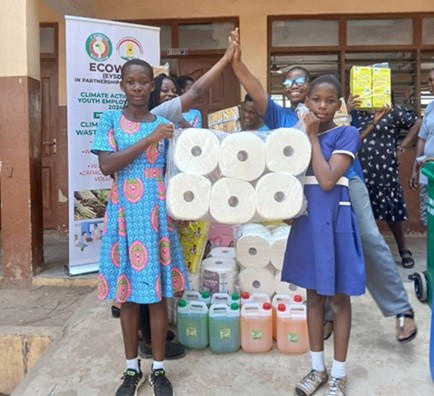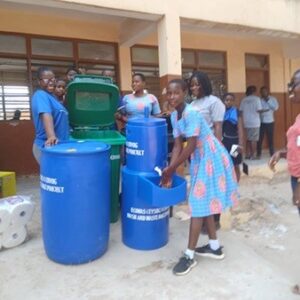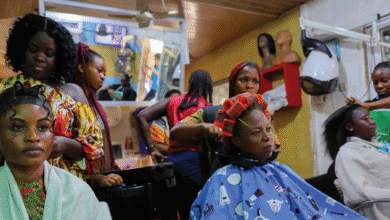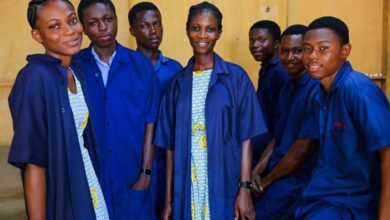COVOG, ECOWAS Boost Menstrual Hygiene Support for Girls in Accra

Access to sanitary pads remains a major challenge for many schoolgirls, forcing some to miss classes due to cost constraints and unavailability. To address this, the Coalition of Volunteering Organizations, Ghana (COVOG), in collaboration with the ECOWAS Youth and Sports Development Center, has provided menstrual hygiene support to girls at Kwashieman Anglican B Primary and 2 JHS in Accra and the Tetteh Ocloo State School for the Deaf in Ashaiman-Adjeikojo.
The initiative, part of COVOG’s Water, Sanitation, and Hygiene (WASH) program, aims to promote menstrual hygiene and overall sanitation in schools. The donation included sanitary pads, waste bins, handwashing stations, tissue papers, detergents, and water drums.
Alleviating the Burden of Menstrual Hygiene Costs
COVOG President, Mrs. Lilly Bright Tetteh, emphasized the importance of menstrual hygiene support for schoolgirls, stating that the initiative is designed to ensure that girls do not miss school due to lack of sanitary materials.
“Today, we are implementing the WASH component of our project, focusing on menstrual hygiene to ensure that young girls have access to proper sanitary materials. Many girls struggle with the cost of sanitary pads, which affects their education. Through this initiative, we aim to reduce that burden,” she said.
Madam Anne Nyakoah Yeboah, the Coordinator for the School Health Education Programme (SHEP) at Kwashieman Anglican 2 JHS, welcomed the support, describing it as a timely intervention.
“Sanitary pads are essential, yet many of our girls cannot afford them, leading to absenteeism. This donation is a major relief and will help keep more girls in school,” she noted. She further appealed for continuous assistance, highlighting that close to 300 menstruating girls in the JHS and upper primary levels require such support.
Enhancing Hygiene and Environmental Sustainability
Beyond menstrual hygiene, the initiative also seeks to promote environmental sustainability and waste management in schools. Project Youth Coordinator for COVOG in Greater Accra, Ms. Confidence Denkudi Adzo Fiatsi, explained that the program integrates waste management education with employability opportunities.
“Teaching proper waste disposal and recycling can create jobs. Plastic waste, for instance, can be repurposed into useful items like baskets and bins, creating employment opportunities for young people,” she said.

The intervention also comes in response to a fire outbreak on December 17, 2024, which destroyed parts of the Kwashieman Cluster of Schools, including waste bins used by students. The replacement of these bins was part of the broader support package.
The partnership between COVOG and ECOWAS is expected to enhance hygiene practices in schools while fostering a culture of volunteerism and sustainable environmental management.




